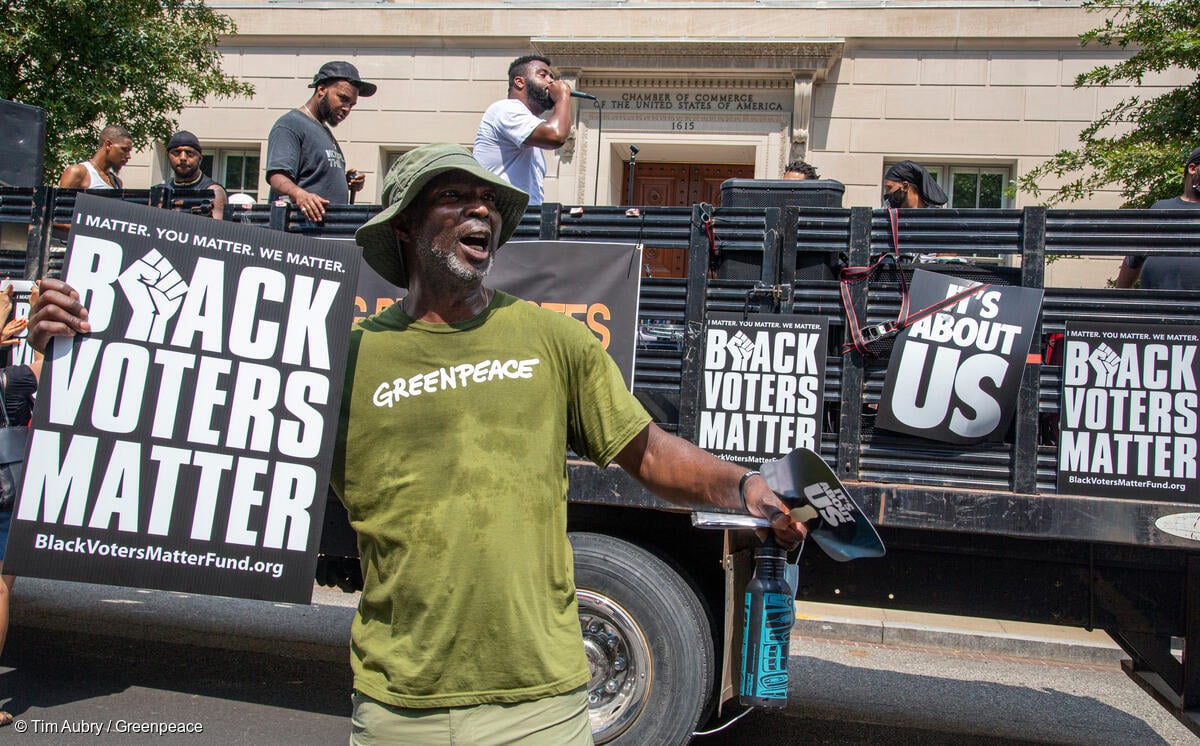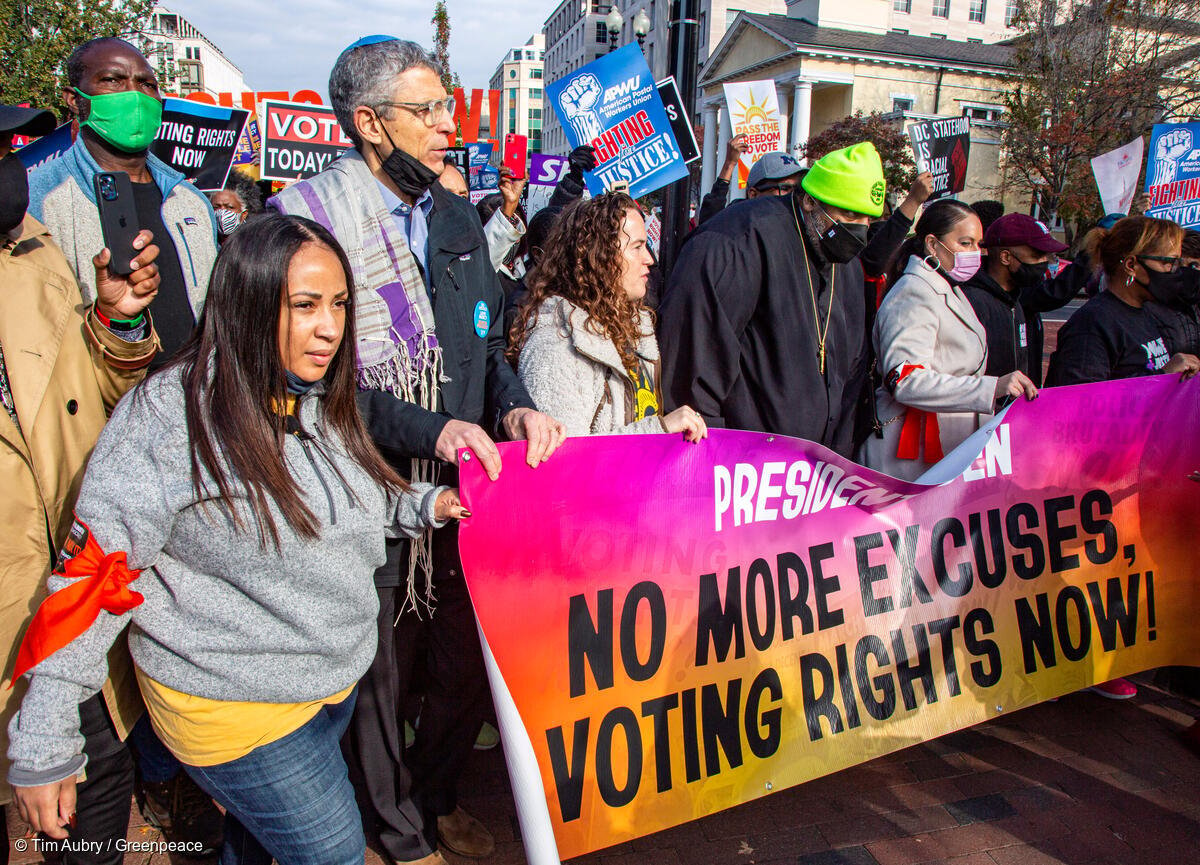Black and Brown people have been involved in every struggle and pivotal moment in American history, even when we did not have full equality before the law or full recognition that our lives matter. It has been no different for the environmental movement and the heroes fighting in this space.

“A people without knowledge of their past history, origin, and culture is like a tree without roots.”
-Marcus Garvey
During Black History Month, we pause to reflect on our collective journey and how we came to be where we are today. We celebrate our heroes, highlight Black excellence, and uplift those in our communities carrying on the good fight against systemic racism for persons of color.
And this year’s Black History Month is taking a special look at “Black Health and Wellness.” The theme lifts up the legacy of Black scholars and “other ways of knowing” (e.g., birthworkers, doulas, midwives, naturopaths, herbalists, etc.) throughout the African Diaspora. It also calls for examining how healthcare has often underserved the Black community.
At Greenpeace USA, we want to particularly lift up the movement for environmental justice as a key to Black health and wellness.
Why Environmental Justice Is Crucial to Our Health
For us at Greenpeace USA, we know that the environment – the entirety of the places surrounding things, conditions, or influences – in which we live is a crucial determinant of our health. We also know that the painful legacy of racism, colonialism, and segregation perpetrated against us over hundreds of years has never truly left our communities. The deep wounds they have inflicted have continued to manifest themselves in ways that harm the health and well-being of people of color to this day.
Redlining strategies shuffled Black and Brown people into treeless urban deserts where our children are more likely to develop asthma as they struggle to breathe through the smog and pollution. Our communities are less likely to have access to safe drinking water, and some, like Flint, Michigan, have suffered quietly while public officials insist that lead-infested water is safe for human consumption. The concentration of industrial petrochemical plants in and near Black communities results in them trying to live under a blanket of toxic fumes. In the process, communities like Saint James Parish in Louisiana gain the unsavory and stark moniker of “Cancer Alley,” Black bodies are sacrificed for corporate profit, and families are left to grieve the loss of their loved ones.

Black Voters Matter along with Long Live GoGo, The Live Movement, Greenpeace, ShutDown DC, and other local and national organizations at the U.S. Chamber of Commerce for a live concert and rally in support of voting rights.
Building the Movement to Win Environmental Justice
But the past is not prologue, and our present is not our future. We know from our hard-won successes that we can stand up to the Goliaths of this world.
Black and Brown people have been involved in every struggle and pivotal moment in American history, even when we did not have full equality before the law or full recognition that our lives matter. It has been no different for the environmental movement and the heroes fighting in this space. The notion that environmental activism is the reserve of wealthy and privileged white people is one that we must topple on its head.
The fight for environmental justice is one of the key battles for our generation, and as our Co-Executive Director, Ebony Twilley Martin said, as she stepped up to become the first Black woman to lead a national legacy environmental organization, “If we’re going to combat the climate crisis, we have to have the broadest, most diverse organization and movement.” At that time, Ebony shared her vision of acting as a bridge between Greenpeace and communities of color as she invited more folks to join the ranks.
Building Black Wellness at Greenpeace
In order to further build the already thriving environmental justice movement, Greenpeace is working to center Black leadership and wellness internally. It’s a long road, but we’ve made progress.
Even before becoming Co-Executive Director, Ebony overhauled the organization’s recruitment and compensation practices and contributed to the hiring and promotion of the largest number of BIPOC managers and leaders in Greenpeace U.S.A. history, moving from 8 percent in 2013 to 37 percent. She has also introduced us to new perspectives, voices, and climate solutions from Black-led coalitions. She stood shoulder-to-shoulder with BIPOC communities and organizers such as Ben Jealous, Dr. William Barber II, the co-founders of Black Voters Matter Fund, and others to fight for voter rights and an economy that works for people – not for those who are destroying our planet.
As Co-ED she is working to advance Greenpeace USA’s multi-year process to embed justice throughout the organization, specifically through strengthening the management function and culture change. Ebony describes equipping Greenpeace leaders with a better understanding of the challenges facing communities of color and outlining opportunities to dismantle discriminatory systems that persist within our world as one of her main priorities in this process.

Ebony Twilley Martin, Greenpeace USA co-Executive Director, left, leads the march down Black Lives Matter Plaza during The No More Excuses: Voting Rights Now! Action.
The Fight Ahead
The COVID-19 pandemic has exploited and exacerbated structural, social, and economic weakness, and our communities have been among the most impacted. Therefore, we know that it is not enough for us to go back to normal while facing the intertwined crises of the climate emergency, COVID-19, and systematic racism. We must chart a course to a just, inclusive, and sustainable recovery. For this, we need our elected representatives to divest from systems of exploitation and extraction — like fossil fuels — and invest in workers, families, and communities.
These crises, goals, and the successes achieved so far by Ebony and the other BIPOC staff at Greenpeace USA, are a testament to why even more black voices are needed in this movement. We are strong, ingenious, and resilient people. We have fought our way, literally and figuratively, to “the table.” And when there was no table, we built our own! Each generation has taken on the fight and advanced us further along the battlefield, closer to the point where we bend the moral arc of the universe towards true equality and justice. So, however you envision the enduring “Dream” of Martin Luther King Jr. and your role in making the world a better place for yourself and your future generations, we at Greenpeace invite you to partner with us because we are stronger together. Let us, Lift Every Voice and Sing!
